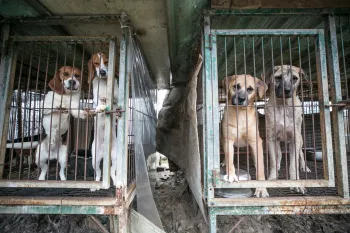SEOUL—Humane World for Animals Korea rescued 67 dogs this past May from a dog meat farm in Cheongju, Chungcheongbuk-do. Actor and advocate Daniel Henney, who adopted his dog Juliette after she was rescued by the organization, joined the deployment effort, making the mission all the more significant.
After being transported to the care and rehabilitation centers operated by Humane World for Animals (formerly called Humane Society International) in the United States and Canada, the rescued dogs received thorough veterinary check-ups and expert care to support their recovery, ensuring a period of stability and adjustment before entering the adoption process.
Of this group, several Jindos have already been adopted in Canada, finding happiness in the arms of their new families. In celebration of International Dog Day (Aug. 26), the heartwarming journey of four of these dogs—once confined to barren cages and destined for slaughter, now cherished as beloved companions with warm beds, toys, nutritious meals and loving homes—has made its way back to South Korea as a story of hope.
Families who adopted the rescued dogs all agree: these dogs are remarkably gentle, and they give love no differently than any other companion dogs. Their shared sentiment and disposition stand as proof that the widespread prejudice in Korea—that “dogs raised on meat farms are a separate breed destined for consumption and cannot adapt as companion animals”—is a misconception.
Max, one of the rescued dogs, has now been renamed Chingu and enjoys playing with the young son of his new family. Adopter Jennifer Trudel said, “At first, he was very fearful, but now it’s touching to see him wagging his tail and running around. Chingu has become a source of great joy for our family.”
Formerly called Moose, another Jindo has begun a new life under the name Kimchi. Adoptive couple Paule Geoffroy and Victor Gaudreault shared, “Kimchi has completed our family. We are excited about all the adventures ahead of us together, and we hope that every dog in South Korea can be given a second chance just like Kimchi.”
Twinkle, now named Kiwi, has shown a unique personality with a love for music as she adapts to her new life. Her adopter, François Lévesque, said, “Kiwi responds to piano and flute playing by wagging her tail or twitching her ears. Every day with her is full of surprises.”
Additionally, Cinnamon, another of the rescued dogs, was adopted under the new name Peach, and is now living a full and happy life with adopter Chloe Emond-Lane, a Humane World for Animals Canada staff member who fell in love with Peach when she arrived at the care and rehabilitation center.
Sangkyung Lee, campaign manager at Humane World for Animals Korea, said, “The transformation of the dogs we rescued from the dog meat farm in Cheongju shows that the social prejudice that ‘meat dogs cannot become companion animals’ is simply wrong. Every dog, regardless of the environment they were born into, has the right to happiness. And not only dogs, but all living beings deserve respect.”
Since South Korea’s Special Act to ban the dog meat industry passed unanimously in the National Assembly in January last year, the Ministry of Agriculture reports that approximately 70% of dog meat farms in the country have shut down or transitioned. This is an encouraging shift, yet during this phase out period, questions remain as to where the remaining dogs have gone and how the dogs still on existing dog meat farms will be protected.
On this issue, Sangkyung Lee stressed, “The end of the dog meat industry is underway but ensuring the welfare of rescued dogs and addressing the situation for those dogs still on farms remain critical challenges. On International Dog Day, we urge both the government and civil society to take shared responsibility and work together to find lasting humane solutions for these dogs.
International Dog Day on Aug. 26 is a global celebration of the special bond between humans and dogs. The happy ending stories of the Cheongju dog meat farm rescue dogs illustrate a turning point for Korean society as it moves away from the dog meat industry and toward the protection of companion animals.
Fast facts:
- Humane World for Animals’ rescues are conducted in compliance with national and local health and safety protocols including evaluation by a veterinarian and vaccination against rabies, distemper, hepatitis, parvo virus, parainfluenza, leptospira and canine influenza, as well as screening for respiratory illness as needed to ensure the health of each animal and comply with international export and import requirements.
- South Korea’s ban or Special Act on the dog meat industry was unanimously passed in the National Assembly in January 2024. It comes into full effect in February 2027 making it illegal to farm, kill, butcher or sell dogs or dog meat for human consumption, with penalties of up to two years in prison and a fine of up to ₩30 million (US$20,637).
- Ministry of Agriculture statistics estimate there were 5,898 dog meat businesses at the time of the Special Act passing which include 1,537 farms, 221 slaughterhouses, 1,788 traders and 2,352 restaurants.
- Latest opinion surveys show that most South Koreans (86%) don’t have any interest in eating dog meat.
- Dogs suffer immensely on dog meat farms, both physically and mentally. They spend their entire lives in small, barren, wire cages without proper food, water, stimulation, comfort, shelter or veterinary care. Death is by electrocution.
- Humane World for Animals South Korea is the Seoul office of international animal protection charity Humane World for Animals that campaigns across Asia and with local partner groups in China, Indonesia, South Korea, India and Viet Nam to end the dog and cat meat trade.
Download photos and video of:



